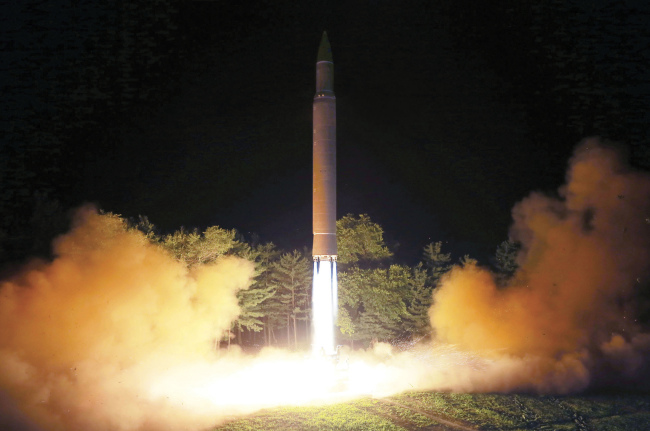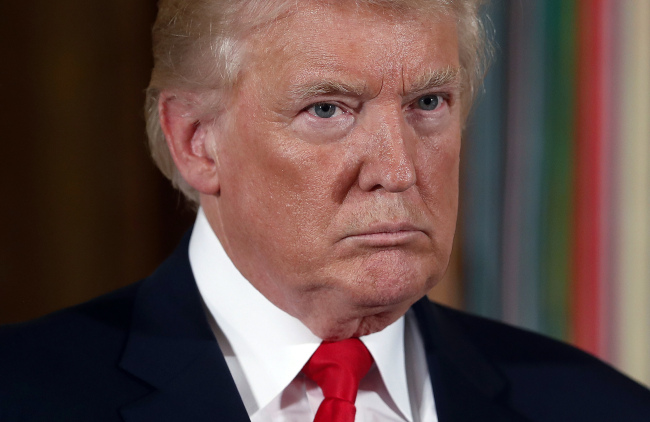[Feature] In Seoul, eerie feeling of fate in hands of others
Many say Trump’s unpredictability more worrisome than NK missiles
By Korea HeraldPublished : Aug. 4, 2017 - 18:02
Life in Seoul continues as usual, as if there were no military threats emanating from North Korea, a communist regime with 1.2 million active soldiers and formidable artilleries pointed at the South Korean capital, just a scant 50 kilometers from the border.
Many say they have grown accustomed to the menacing words and provocative actions from their northern brethren, so much so that it feels like a regular part of everyday life here.
Many say they have grown accustomed to the menacing words and provocative actions from their northern brethren, so much so that it feels like a regular part of everyday life here.

“We’re so used to hearing such news,” 32-year-old banker Kim Jin-yong said about Pyongyang’s recent tests of its first intercontinental ballistic missiles, which experts have described as a major development and a possible game changer.
“I don’t even bother to count (how many missile tests North Korea conducted this year) as this kind of things have been going on for the past decades,” he said.
A civil servant working for the city government highlighted the “mature” attitude of residents here, saying, “Worrying about national security on the individual level won’t stop the North from developing missiles anyway.”
Yet, there were also many who, when asked by The Korea Herald, said they were more worried than before, due to the North’s escalating military provocations that have made the small, impoverished regime in the Far East a top security concern for the US. The North’s latest test of an ICBM marked a step closer to them being capable of striking the US mainland with a nuclear weapon. To attack the South, conventional artillery and short-range missiles would suffice.
The situation gives many South Koreans an eerie feeling that their fate is falling into the hands of others, namely US President Donald Trump and the North’s leader Kim Jong-un.
“My biggest worry is that the US would plot a pre-emptive attack on North Korea and carry it out without consulting our government,” said Kim Ho-joon, a 40-year-old office worker.
“I think it may be a plausible option for the US, because the war would play out on the Korean Peninsula, not on their land.”
A 30-year-old Korean-American office worker, Lee Ha-young expressed similar concerns over what the escalating hostilities between the North and US would mean for South Korea.
“What if Trump posts a tweet like ‘North Korea is out of control and it must be taken down’ and North Korea takes it as a declaration of war?
“North Korea is irrational, but not irrational enough to risk the survival of its own regime. But with Trump’s reckless words, I fear the North may feel pressured to do something more dangerous,” Lee said.

Fueling such worries have been Trump’s inconsistent remarks swinging between the possibilities of a military strike against the North to a more reserved diplomatic approach, as well as the growing belligerence among Americans against the defiant North Korean regime.
In an interview with Reuters in April, after ordering a missile attack on Syria for its use of chemical weapon against civilians, the US president said a “major, major conflict” with the North was possible.
Two days after the North’s July 4 ICBM test, which Trump had previously said “won’t happen,” he said he had “severe things” on his mind.
And this week came the unnerving news that the US president told a senator that he was willing to go to war with the North.
“If there’s going to be a war to stop him (North Korean leader Kim Jong-un), it will be over there (on the Korean Peninsula,)” Sen. Lindsey Graham said on a TV show. “If thousands die, they’re going to die over there. They’re not going to die over here -- and he’s (President Trump) told me that to my face.”
A Fox News poll in July found 55 percent of Americans think the US should seek military options against the North and 68 percent said they were worried about a war with North Korea. A Washington Post survey revealed a similar result, with 74 percent of respondents expressing concerns about the possibility of a “full-scale war” with the North and 66 percent saying the communist country poses a “direct threat” to US security.
“I don’t know exactly what Trump’s policy on North Korea is,” said 28-year-old graduate student Ham Young-ku. “Sometimes he talks about military strikes and then suggests diplomacy. ... I just hope he won’t do something crazy.”
In Seoul‘s National Assembly, conservative opponents of President Moon Jae-in are speaking up about South Korea being sidelined in US-led discussions on the North Korean issue, which is critical to the South’s national security. They wanted the president to cut short his scheduled vacation and return to work immediately, saying the security crisis the country is currently facing is the greatest since the end of World War II.
To be sure, much of the political rhetoric on the North is meant to criticize liberal President Moon -- whose recently unveiled peninsular peace initiative is “naive and unrealistic,” according to them -- not to offer an objective assessment of the country’s security conditions.
Military experts here and abroad view the idea of the US carrying out a pre-emptive strike on the North, in particular without consulting South Korea, as far-fetched.
The last time the US seriously considered attacking North Korea was in 1994 when then-Defense Secretary William J. Perry sought a “surgical strike” against the North’s nuclear reactor. He canceled the plan after concluding that it would escalate into a full-scale war that could lead to hundreds of thousands of civilian casualties.
Even if the US were to proceed with a surprise military campaign -- like the one Trump conducted in Syria -- the allies have built “procedural safeguards” that can prevent Trump or any other US president from acting unilaterally, experts said.
Under the current chain of command, the Combined Forces Command, the allies’ supreme command during the wartime, cannot engage in a military mission unless there is a prior agreement between the two countries’ military and political leaders.
“The United States’ unilateral pre-emptive strike against North Korea is impossible unless the US wants to completely destroy the South Korea-US alliance,” said Kim Yeol-su, an international politics professor at Sungshin Women’s University in Seoul.
President Moon and top security officials in Seoul have said repeatedly that they will not let another war happen on the peninsula.
In an effort to assuage the public again, Cheong Eui-yong, chief of the National Security Council, on Thursday revealed that the Seoul government had confirmed with the US, through many channels, that war would not break out.
By Kim Da-sol, Yeo Jun-suk (ddd@heraldcorp.com) (jasonyeo@heraldcorp.com)
-
Articles by Korea Herald



















![[Today’s K-pop] Treasure to publish magazine for debut anniversary](http://res.heraldm.com/phpwas/restmb_idxmake.php?idx=642&simg=/content/image/2024/07/26/20240726050551_0.jpg&u=)